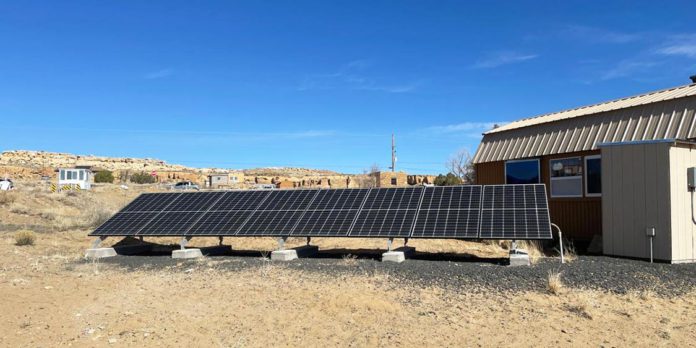WASHINGTON, D.C. – The Department of the Interior has announced a $71 million investment from President Biden’s Investing in America agenda to electrify homes in 13 tribal communities across Indian Country, helping to close the tribal access-to-electricity gap. The investment from the Inflation Reduction Act is a critical step toward the goal of electrifying all homes in the U.S. with clean energy sources and advances the Biden-Harris administration’s work to reach a carbon pollution-free electricity sector by 2035.
This second and final round of funding from the Bureau of Indian Affairs’ Tribal Electrification Program, is part of an overall $150 million commitment to provide financial and technical assistance to connect homes in tribal communities to transmission and distribution that is powered by clean energy; provide electricity to unelectrified homes through zero-emissions energy systems; transition electrified homes to zero-emissions energy systems; and support associated home repairs and retrofitting necessary to install the zero-emissions energy systems. In addition, the program supports clean energy workforce development opportunities in Indian Country.
“Every family deserves to have access to reliable, affordable electricity,” said Secretary Deb Haaland. “Now, with historic investments from President Biden’s Investing in America agenda, we are honoring our commitment to deliver clean energy to Indian Country to electrify more homes. This new program is building reliable, resilient energy that tribes and communities can rely on, and advancing our work to tackle the climate crisis and build a clean energy future.”
“Indian Affairs’ Tribal Electrification Program continues to provide tribes with the assistance they need to ensure their communities have safe, reliable electricity, which is essential to daily living,” said Assistant Secretary for Indian Affairs Bryan Newland. “Working with tribal governments on developing clean energy sources and bringing the benefits of dependable electricity to their communities is part of our mission of service to federally recognized tribes.”
This announcement follows the program’s first round of funding of $72 million awarded to 21 tribes and tribal organizations, which Secretary Haaland announced in March during a visit to the Hopi Tribe in Arizona. By recognizing that each tribe has its own energy- and electrification-related needs and implementation capacity, the Tribal Electrification Program is meeting the unique needs of individual communities.
In 2000, the Energy Information Administration estimated that 14 percent of households on Native American reservations had no access to electricity, which was 10 times higher than the national average. In 2022, the Department of Energy Office of Indian Energy issued a report citing that 16,805 tribal homes were unelectrified, with most being in the Southwest region and Alaska.
Funding through the announcement is going to the following tribes:
| Tribe or Tribal Organization | State | Funding |
| Rosebud Sioux Tribe | South Dakota | $11,850,000 |
| Red Lake Band of Chippewa Indians | Minnesota | $8,738,100 |
| Navajo Tribal Utility Authority | Arizona, New Mexico and Utah | $7,376,200 |
| Eastern Shoshone Housing Authority | Wyoming | $7,375,000 |
| Bois Forte Band of Chippewa | Minnesota | $6,479,000 |
| Hopi Utilities Corporation | Arizona | $6,060,459 |
| Kootznoowoo, Incorporated | Alaska | $5,998,319 |
| Yurok Tribe | California | $4,300,143 |
| Quinault Indian Nation | Washington State | $3,948,800 |
| Levelock Village | Alaska | $3,313,979 |
| Tanana Chiefs Conference | Alaska | $3,000,000 |
| SAGE Development Authority (Standing Rock Sioux Tribe) | North Dakota and South Dakota | $2,000,000 |
| Ewiiaapaayp Band of Kumeyaay Indians | California | $560,000 |
The Tribal Electrification Program advances the Biden-Harris administration’s Justice40 initiative, which sets the goal that 40 percent of the overall benefits of certain federal investments flow to disadvantaged communities that are marginalized by underinvestment and overburdened by pollution, including federally recognized tribal nations.














































